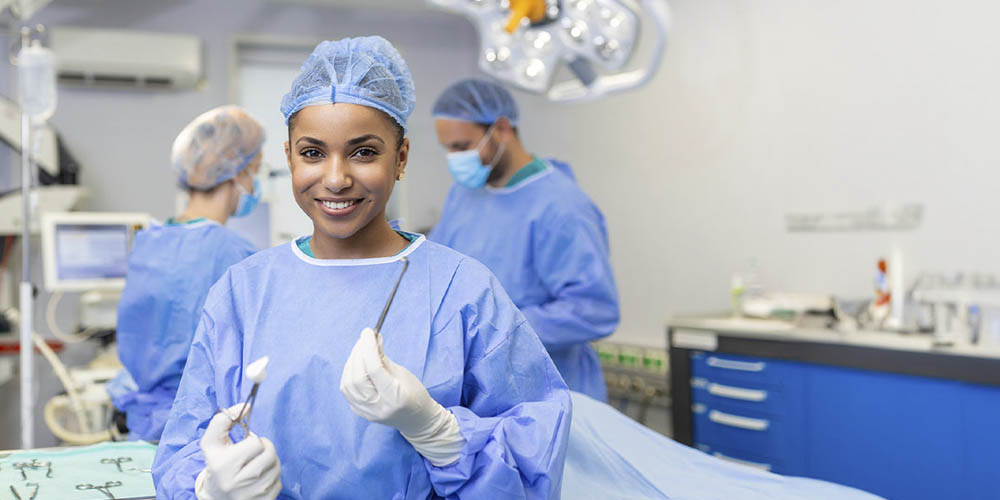Safeguarding surgery
As a surgical technologist, you’ll likely be the first in the operating room. You’ll prepare the instruments surgeons use and set up a sterile field which you will monitor and maintain throughout the surgery.
You’ll also assist in draping the patient, perform counts of all instruments and items, ensuring that nothing is left behind in the surgical site, and pass instruments and other items to the surgeon during the operation.
It’s a crucial role on the surgical team and our program will prepare you to do it with skill and confidence.
For a look at all the courses in our program, consult the course list.

State-of-the-Art Learning
Our faculty have all worked on surgical teams as surgical technologists and will make sure your skills are sharp and you know what to expect.
You’ll learn in classrooms, labs and on clinical assignment in a hospital as you gain the skills necessary to become a vital member of the surgical team.
Your courses will include:
- Medical Terminology
- Introduction to Surgical Technology
- Orientation to Central Processing Distribution Technician
- Introduction to Surgical Patient Care Techniques
- Surgical Specialties
- And more!
And the credits you earn in our courses will transfer to a four-year college or university if you’re interested in earning a bachelor’s degree and taking on greater responsibilities in the operating room.
Employment-ready certificate option
At Macomb, you have the option of earning a Central Processing Distribution Technician Certificate, qualifying you to work as a sterilizing processing technician.
It’s a resume-worthy experience in your field and an income while you pursue an associate degree in Surgical Technology.
And the certificate program does not fall under selective admission guidelines and can be completed in one semester after completing two prerequisite courses.
Ready for surgery?
Contact Geniene Kreger at kregerg07@macomb.edu or 586.286.2073.
A shortage of surgical techs
There’s a great need for surgical technologists and you shouldn’t have any problem finding work after you complete our program.
Use this handy tool to see what’s available locally and what you can expect to earn.
And if you aren’t recruited out of the program or during your clinicals, our Career Services team can help you with the job search, preparing for interviews and polishing your resume.
Additional Information
Select programs in Health and Human Services require specific criteria to gain admission, such as testing requirements or minimum grade point average in prerequisite courses. Please view the Selective Admissions program application packet for information on application requirements, ranking and deadlines.
For information on how to apply to a Selective Admissions program, please email us at selectiveadmissions@macomb.edu. Selective Admissions applicants are encouraged to meet with an academic advisor or counselor prior to submitting an application to the program. This meeting will allow for review of the application process, program prerequisites and requirements. Contact the Counseling and Academic Advising Office at 586.445.7999 for office hours.
Upon successful completion of this program, students will sit for the national certification examination. Those who pass the examination earn the title of Certified Surgical Technologist (CST).
Program Retention Rate
The following rates describe students who remained in the program until successful completion and graduation:
| Year | Rate |
|---|---|
| 2022 | 100% |
| 2023 | 90% |
| 2024 | 87% |
CST Pass Rate
The following rates describe program graduates who passed the CST exam:
| Year | Rate |
|---|---|
| 2022 | 71% |
| 2023 | 84% |
| 2024 | 90% |
Employment Rate
The following rates describe graduates who sought employment and were employed as a CST within one year of graduation:
| Year | Rate |
|---|---|
| 2022 | 92% |
| 2023 | 100% |
| 2024 | 100% |
U.S. Bureau of Labor Statistics Occupational Outlook for Surgical Technologists.
The goal of the Health and Public Services Division is to prepare every student to think critically and practice competently and compassionately in rapidly changing environments. All efforts are designed to build knowledge, enhance practical skills, and promote patient and the population’s safety. Furthermore, the program is designed to foster professional integrity and ultimately improve the health outcomes and protection of patients, families, and communities across the continuum of care and practice. Students must possess certain functional abilities, essential for the delivery of safe, effective clinical care and protection of the public during clinical and internship training activities in the field. Therefore, the faculty has determined that certain technical standards are required for admission to, progression in, and graduation from the Health and Public Services (HPS) programs.
In addition to classroom learning, clinical and internship learning occurs throughout the HPS programs and involves considerations (such as patient and population safety and clinical and internship facility safety) that are not present in classroom accommodations. Applicants or students interested in HPS programs who seek accommodations prior to or immediately after enrolling in the college are highly encouraged to also request an assessment of the types of reasonable accommodations needed for the clinical and or internship components of the program.
An individual must be able to independently, with or without reasonable accommodation, meet the following technical standards of general abilities: (1) observation; (2) communication; (3) motor skills; (4) intellectual, conceptual, and quantitative abilities; (5) essential behavioral and social attributes; and (6) ability to manage stressful situations. Individuals unable to meet these technical standards, with or without reasonable accommodation will not be able to complete the programs and are counseled to pursue alternative careers.
SPECIAL SERVICES STATEMENT: Students may individually discuss the essential functions and technical standards with a college counselor from our Special Services department. In compliance with Section 504 of the Rehabilitation Act of 1973 and the American Disability Act of 1991, academic accommodations may be provided to students who have a documented disability.
For further information, visit Special Services.


